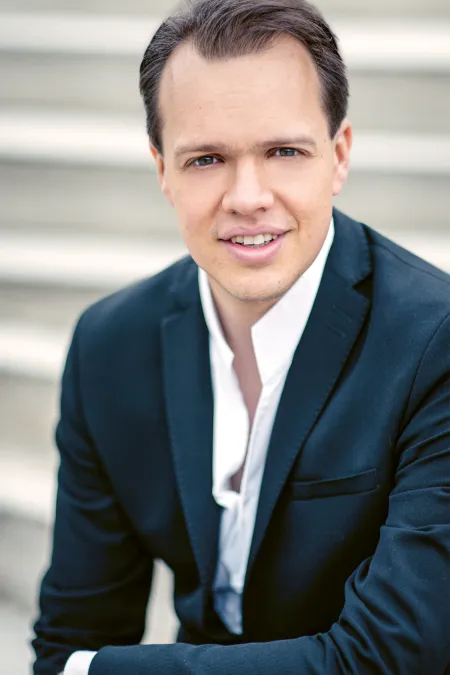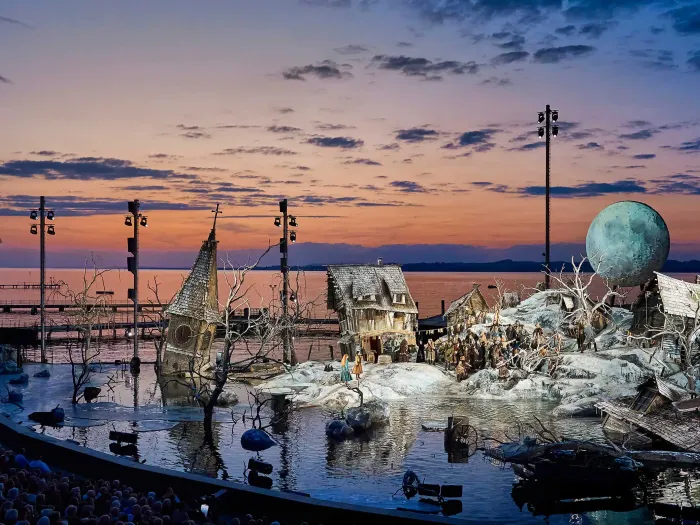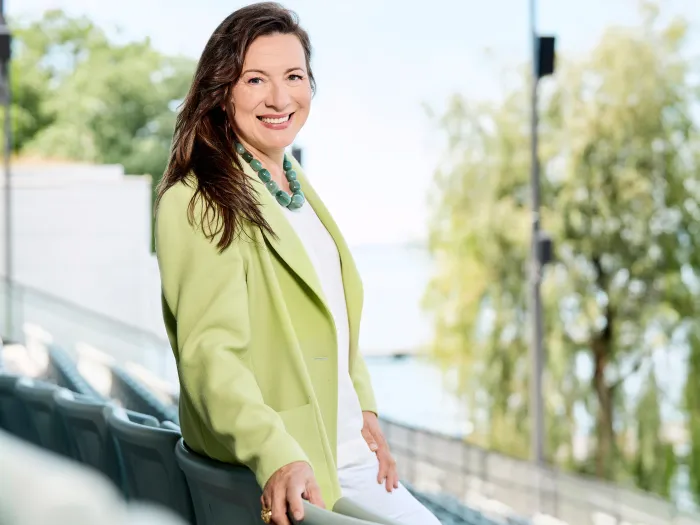Viola Bierich led through the interview.
The text was published in edition 1 (11/24)
Reading time 4 Min.
An iconic outcast

In the festival summer of 2024, Thomas Blondelle performed in Der Freischütz. In the upcoming season, he will return to Lake Constance to lend his voice to the scrivener Max once more.
You play Max, an outcast from the villagers; all the more so in Philipp Stölzl’s Freischütz. How would you describe the role?
I have already been part of several Freischütz productions, and I noticed that I keep growing with the role: At the beginning of the opera, I always think to myself: “He is such a fool! He keeps making the same mistake.” But the more time I spend with him, the more I start loving him. Contrary to the original version of the opera, in our production Max is a scrivener, like he is in the original story, and not a hunter. His job doesn’t really fit in with the villagers and he's the odd one out in this place where only one thing counts: being a good shot. I really like this version of the role.
For me, Max is also a symbol for all the people who feel that life is too difficult. What’s expected from us in daily life is often sheer madness. Every day you have to be there, and function … in our job as well; a job that is characterized by so many fears. You can sing a role for the thousandth time and still, at the first rehearsal of a new production you will be scared of not being good enough. I think that’s a very modern problem.
You live in a small village in the Ardennes in Belgium. Did you draw on some of that experience for Der Freischütz?
Where I live, everyone knows everyone – and I kind of stick out there: Someone who makes his money with singing is a rarity in this world. Another strong parallel to the opera is hunting. The woods at home are full of game and people grow up hunting. It’s a tradition. But the village is also an ambivalent place – safe and dangerous at the same time: Sure, it’s nice that everybody knows each other, but it’s also scary. There are two sides to the coin. Philipp Stölzl’s production portrays that really well: The houses are always illuminated; everyone looks at them. I really like the ending, when Prince Ottokar appears and the urbanity of the city hits the rural village, so to speak. Everything is in ruins and abandoned, and still, he decides what’s done, even though he doesn’t have a clue.
Unlike in traditional opera houses, on the lake stage you have to use a microphone. Does that affect your interpretation of the role?
Yes, but I feel like it’s an invitation, not a problem. When you use a microphone, you can sing certain passages in an unbelievably soft pianissimo, which is normally almost impossible on an opera stage. But then the sound engineers turn up the volume a notch and suddenly you have a completely new tone color. I’m sure we’ll be able to experiment a bit more with that during the second year of Der Freischütz. Opinions differ on these experiments, obviously: For example, when the devil interrupts Agathe’s aria, probably half of the audience thinks: “Oh god, never again!”, while the other half thinks it’s exciting and interesting. If certain players in the opera world weren’t so old-fashioned, I’m sure we could experiment even more elsewhere.
It was your first time at the Bregenzer Festspiele this year and you will return next year for Der Freischütz. What do you look forward to? And is there something you want to do differently?
Maybe not differently, but I want to take certain aspects further. I really can’t wait for the second year of Der Freischütz, because we don’t feel the pressure of the premiere. We have time to try out some things. Personally, I want to work more on those scenes, where the characters come together, and the focus is on interpersonal relationships. I would like certain relationships to be easier to understand, particularly the relationship between Agathe and Max. Sometimes I feel like an act is missing at the beginning of this opera; something that explains their history. Maybe we can include that in the overture by adding a dialogue or the devil talks about it … for me, it’s exciting to think about this.
The stage is huge and half of it is flooded. Did you know what to expect before you came here?
I had a videocall with Philipp Stölzl, the director, and he asked me how I felt about water. I said that I’d be okay with that. I grew up on the Belgian coast, I love water. The team in Bregenz is highly professional and I always felt safe. And the water just fits so well into the production, because it “tugs” at the characters and adds a certain seriousness. My favorite moment is during Kaspar’s aria, when I climb to the top of the hill with the eagle on my shoulder and the music rattles along like a millwheel – it seems so arduous. During every performance I think to myself: “There’s no other place where you can play like this!” And – although the audience doesn‘t see that – when you reach the top there’s only a small streak of light on the horizon and all of Lake Constance lies in front of me. It’s just breathtaking.
…and certainly, very strenuous!
Yes, especially when you wear that costume and a wetsuit underneath and then you step into the water with that coat – it feels like the coat suddenly weighs thirty kilos more. After a show, I’m really exhausted; and that says a lot about the two-hour performance. It’s not to be underestimated.
I will treasure the silent moments onstage.
Final question: What will you remember from your summer in Bregenz?
Wetsuits! I hate them. They’re horrible, they’re not breathable, but apparently, they keep you warm. It’s funny because some days were so warm that I contemplated playing without a wetsuit – but in the end, I didn’t dare do it.
Now, let’s be serious: I will treasure the silent moments onstage. When, right at the beginning of the opera, Max is almost killed and everyone goes silent because, obviously, nobody expects it, - I love this moment. Or when Kaspar comes in after Max’s aria and, just like that, silently enters his life. Yes, I will always remember these moving, little moments. And the mountains. Unfortunately, I couldn’t go very often, but when I did, it was beautiful. Hopefully I’ll get to do it more often next year.




